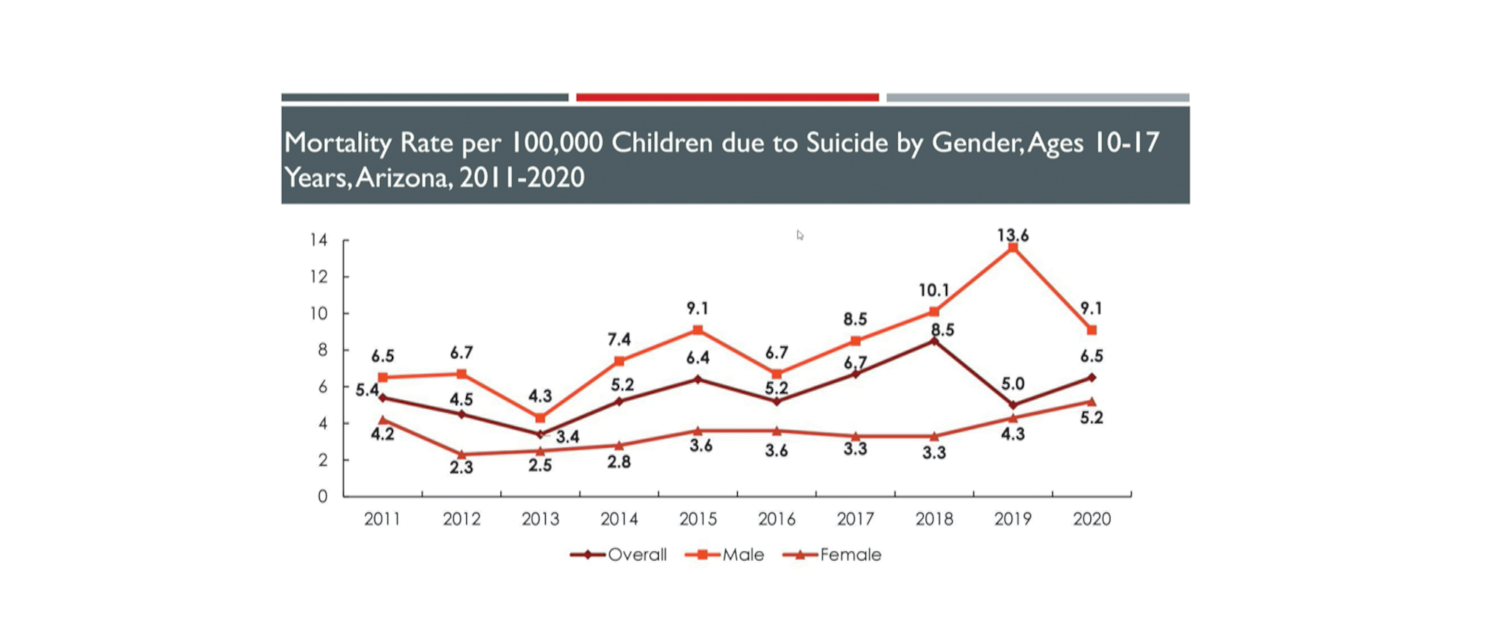[ad_1]
By Paul Maryniak
Executive Editor
A special state House committee on teen mental health in Arizona held its first meeting June 12 with one of the panel’s two co-chairs warning people not to expect any overnight fix.
And with that warning by Gilbert state Rep. Travis Grantham, panel co-chair and Goodyear Rep. Joanne Osborne asked the participants to form three or four working groups and come back with specific proposals by September that can be studied and debated through the fall and presented to House Speaker Rusty Bowers before the end of the year.
Reacting to a spate of suicides that claimed the lives of at least eight Valley teens between mid-March and mid-May, Bowers, R-Mesa, created the panel of mental health experts to prepare potential solutions and recommendations to public and private agencies that address teen mental health issues and improving access to mental health care.
Various expects on June 12 pointed out a variety of data illustrating that more teens – as well as adults – are struggling with anxiety and other mental and emotional issues that only intensified and engulfed more kids during the pandemic.
Some experts also noted that access to care is difficult, often because of cost.
Despite the steady increase in drug overdose deaths among Arizona kids 17 and under, there were some encouraging signs in 2020, said Sheila Sjolander, assistant director of public health services for the state Department of Health Services.
Although data for 2021 won’t be available until November, she said deaths and nonfatal overdoses in that age group declined slightly in 2020, giving what Sjolander called “a glimmer of hope.”
Grantham warned the panel and people in the audience against unrealistic hopes for the committee’s work.
“There was an understanding that while mental health can be addressed and can be changed and for the better,” he said, “it’s like steering a ship: you turn the wheel and over time, the ship slowly starts to move, hopefully, in the right direction. It’s not an overnight fix.”
He said that in relation to teen mental health, the Legislature first wanted to address funding for school resource officers “because if somebody at school is going to have something in their backpacks or do something bad because they’re suicidal or because they have a mental health issue, we at least want every single request for an SRO at a school to be filled before addressing the next step, which was additional counselors and all those mental health programs and things that are important.
“But we’ve gotten to a point where even if we threw $10 million at counselors, it wouldn’t change these problems,” Grantham continued, noting that increased funding for SROs was prioritized “to try to at least stop one of these issues from occurring in the first place and then address the mental health as well. “
On a more general note, Grantham said that after six years in the Legislature, he’s learned that government moves much slower than the private business sector.
“We all come down here as legislators thinking we can like just enact or do something and change the trajectory of whatever the issue is,” he said. “It could be taxes. It could be mental health. I’m a business guy too. And government, unfortunately a lot of times, doesn’t work like business.”
He told the group that it may want to consider what it actually can do, admitting “this will be a frustrating exercise.”
“And that’s hard,” he said. “That’s a really hard thing to come up with. Everybody who’s in these working groups …needs to really focus in on what can government actually do to fix this problem? Can I do anything? Where can we focus our energy that way because the battle next year if we address this will be to get here in January and get at least 31 people in this room, in this chamber to agree to whatever is being proposed. And then 16 across the way and then a governor to sign it into law.”
He noted that many agencies “will say ‘we can do that, just give us more money.’
“Well the problem is there’s not enough money for us to give to answer all those questions every year because every agency and every level of government – their asks never go down.”
He added, “I wish there was more God in our schools and our families and our federal moral structure in our country. A lot of these problems would be solved. We have a decay occurring that you can’t fix here. But what you can do is at least try to empower the families give them more of their own resources back to address this internally and encourage them to do it in education. Government can’t legislate morality. We can’t make home life good for this body. All we can do is help create an environment that allows families to have a better home life.”
Osborne, who is running in the Aug. 2 Primary Election, expressed a determination to have the committee produce concrete results that the can be addressed in the next Legislative session as well as by the new state administration next year.
Stressing that “legislation is only a piece of what we’re doing,” Osborne said the panel also can address some of the gaps that experts and advocates noted – including access to mental health care and treatment.
She suggested that some data being generated by agencies that reflect the state of teen mental health could be shared with school districts, churches and nonprofits.
“We also have only a short window of time,” Osborne said. “This isn’t something we want to see (drag) in the next year, planning to death and having just a binder at the end of the day. We want to have something that’s pertinent now – within the next six months.”
What those working groups come up with won’t be clear until the committee meets in full sometime in September.
[ad_2]
Source link



